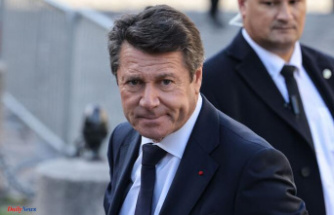For some time now, Ukraine has been trying to hit military targets and logistics in Russia itself. The further the front moves to the east of Ukraine, the more often rockets are likely to fall in the attacker's country.
Belgorod is only 40 kilometers from the Ukrainian border. On April 1, an oil depot burns in the Russian city. Russia blames the Ukrainian military for allegedly firing rockets at the oil storage facility from two helicopters. Finally, at the end of April, an ammunition depot in Belgorod also caught fire. At almost the same time, two oil depots in Bryansk, about 120 kilometers north of the Ukrainian border, caught fire. On April 30, a railway bridge is destroyed in the Kursk region of Russia. The city is about 90 kilometers from the Ukrainian border.
Moscow always says that Ukraine is to blame. Also for explosions in military buildings, also in the Belgorod region on the night of May 1-2. It was a period when there was an unusually large number of "incidents" on Russian territory. In May, a Ukrainian plane is said to have tried to enter the airspace of the Bryansk region, Russia says. In addition, Russia says it shot down a Ukrainian reconnaissance drone over Voronezh at the end of April. The city is about 250 kilometers northwest of the border with Ukraine.
At least in terms of equipment, Ukraine could actually be behind such attacks. The Ukrainian military has several short-range missiles that could be used to target weapons caches or oil depots on Russian territory near the border. Shortly before and after the war began, Ukraine also bought several Turkish Bayraktar combat drones, which, given their range of up to 150 kilometers, would also be capable of such attacks.
However, there is no reliable information or even evidence that Ukraine has attacked Russian targets. Carlo Masala, Professor of International Politics at the University of the German Armed Forces, considers Ukraine's military strikes on strategically important targets to be fundamentally justified as long as no people are hit. "What the Ukrainians are doing on Russian territory can only be seen in relation to the conflict in Ukraine itself. It is legitimate to attack military facilities in Russia," the military expert said in the Stern podcast in May "Ukraine - the situation" made clear.
In early July, however, explosions in the city center of Belgorod killed five civilians and damaged dozens of houses. The victims were a Ukrainian family who had moved to Russia a few years earlier. According to Russian sources, Ukrainian troops had fired at residential areas with Tochka-U ballistic missiles. Russian air defense shot down all three missiles, but part of the missile fell on a residential area, the Russian Defense Ministry said.
Cities such as Belgorod and Russian villages, which lie directly on the border with Ukraine, have become theaters of war, especially since Ukraine has been advancing with its counter-offensive in the east. You are within range of Ukrainian artillery. In battles near the border, rockets sometimes shoot over the border, says retired Colonel Wolfgang Richter from the German Institute for International and Security Affairs (SWP). "It's in the nature of things that the Ukrainians also want to attack the logistics in depth to prevent the Russian Air Force from flying from there," explains the military expert in the ntv podcast "Learned something again."
Richter makes it clear that Ukrainian attacks on Russian territory near the border are "militarily logical". "But there is a certain reservation on the part of the Americans, but also on the part of the Germans, that people say: We don't want to escalate the war on our own initiative. For example, when delivering HIMARS, US President Biden made it clear that he doesn't want that the Ukrainians are shooting across the Russian borders."
The American multiple rocket launchers made a decisive contribution to changing the course of the war. But so far, the US has only supplied Ukraine with HIMARS ammunition, which has a range of up to 80 kilometers. The Americans also have HIMARS rocket launchers that can fire 280 kilometers away. So far, however, Ukraine has not received it. "The awareness of avoiding the risk of escalation is not only a German consideration, but also an American consideration. And I think that this risk assessment is made again and again in the network, especially between Germans and Americans, but also between the British and the French," analyzed Ex-Colonel Judge on Podcast.
International law is on the side of Kyiv on the question of whether Ukraine can attack military targets in Russia. A state under attack has the right to defend itself. This includes military targets in the attacker's country.
But there is also a "real political" perspective, says Wolfgang Richter. NATO doesn't want to become a party to the war, so they try to avoid an escalation and tell the Ukrainians not to shoot at Russia with the weapons they have been supplied. But what Kiev's army does with its own weapons is up to them. "It's a Ukrainian decision. But of course the West will say: We support you, but hold back and don't try to escalate the war to such an extent that Russia can say our existence as a state is at stake," says Richter.
Russian existence is of course not endangered by individual Ukrainian attacks. But the Kremlin is known to spin facts as it suits them. Military expert Richter refers to Russia's nuclear doctrine. It states that a nuclear attack would be justified, among other things, if the very existence of the Russian nation is endangered by conventional attacks. The West does not even want to give Russia any room for interpretation on this issue, Richter suspects.
From Russia's point of view, however, every Ukrainian hit in the annexed regions of Luhansk, Donetsk, Zaporizhia and Cherson is now a hit on Russian territory. However, only Ukrainian territory is at risk. This is also governed by international law.












